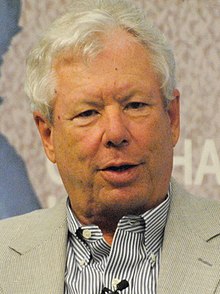Richard Thaler
Richard H. Thaler (born September 12, 1945 in East Orange , New Jersey ) is an American economist and professor at the Booth School of Business at the University of Chicago . He is considered one of the world's leading behavioral economists and advised, among others, the former US President Barack Obama . In 2017 Thaler was awarded the Alfred Nobel Memorial Prize for Economics .
Life
Richard H. Thaler received his bachelor's degree from Case Western Reserve University in 1967 and his master's degree from the University of Rochester in 1970 . In 1974, he was up there with the work The Value of Saving A Life for Ph. D. doctorate . He stayed at Rochester as an assistant professor for four years before moving to Cornell University . There he was Assistant Professor from 1978 to 1980, Associate Professor from 1980 to 1986, Professor from 1986 to 1988 and Henrietta Johnson Louis Professor from 1988 to 1995 . In 1995 he became a Robert P. Gwinn Professor and later a Ralph and Dorothy Keller Distinguished Service Professor at the University of Chicago . In 1994/95 he was visiting professor at the Massachusetts Institute of Technology .
Thaler was President of the American Economic Association in 2015 . In 2017, he was awarded the Alfred Nobel Memorial Prize for Economics for his research on business psychology .
Scientific impact
Thaler works in the field of behavioral economics ; he studies market anomalies and decision-making processes. He is concerned with the effects that people who act in reality - contrary to economic assumptions to the contrary - do not always act as " homo oeconomicus ", i. H. does not always make rational decisions in favor of one's own interests. For example, Thaler found evidence for the path dependency of risk behavior (small profits lead to taking ever greater risks) as well as for voluntary cooperation when a lot is at stake. The incentives introduced in the United Kingdom to increase the participation of the population in pension funds go back to the reception by the British Conservatives of the book Nudge , co-authored by Thaler and Cass Sunstein . Because Thaler's demand for government behavior incentives that the for myopia ( myopia -prone) masses by nudging could motivate an economically rational behavior, his approach was neoliberal critics like Casey B. Mulligan called "paternalistic". From the point of view of democracy theory, the objection is that nudging enables politicians to disregard the will of the people or to manipulate it with economic incentives.
Thaler is at least partially in favor of the abolition of cash because he considers its use to be irrational and corruption-promoting. He welcomed the abolition of the 500 and 1000 rupee notes in India in 2016, which, however, led to temporary chaos. Critics consider the widespread reservations against the abolition of cash due to the impending loss of anonymity and the risk that the full digitalization of money could lead to government financing through negative interest rates as thoroughly rational.
Works
- The Value of Saving A Life. A Market Estimate . Dissertation.
- Quasi rational economics . Russell Sage Foundation, New York 1991, ISBN 0-87154-846-1 .
- The winner's curse . Paradoxes and anomalies of economic life . Free Press [u. a.], New York 1992, ISBN 0-02-932465-3 .
- as editor: Advances in behavioral finance . Volume 1, Russell Sage Foundation [et al. a.], New York 1993, ISBN 0-87154-844-5 , ISBN 0-87154-845-3 ; Volume 2, 2005, ISBN 0-691-12175-3 , ISBN 0-691-12174-5 .
- with Cass Robert Sunstein : Nudge. Improving decisions about health, wealth, and happiness . Yale University Press, New Haven [et al. a.] 2008, ISBN 978-0-300-12223-7 ; German as: Nudge. How to initiate smart decisions (translated by Christoph Bausum). Econ, Berlin 2009, ISBN 978-3-430-20081-3 ; as paperback: Ullstein, Berlin 2011, ISBN 978-3-548-37366-9 .
- Misbehaving: What behavioral economics tells us about our decisions . German translation by Thorsten Schmidt. Siedler Verlag, Munich 2018, ISBN 978-3-8275-0120-2 .
Awards
- 2003 Honorary Doctorate , Case Western University
- 2005 Paul A. Samuelson Award (for the article Save More Tomorrow, written with Shlomo Benartzi . Using Behavioral Economics to Increase Employee Savings . In: Journal of Political Economy . Volume 112, No. 1, 2004, pp. S164 – S187)
- 2014 World Economic Prize
- 2017 Alfred Nobel Memorial Prize for Economics
Memberships
- National Bureau of Economic Research
- American Economic Association
- American Academy of Arts and Sciences
- National Academy of Sciences
Web links
- Literature by and about Richard Thaler in the catalog of the German National Library
- Richard Thaler in the catalog of the ZBW - Leibniz Information Center for Economics (ZBW)
- Richard H. Thaler on the Chicago Booth School of Business website
- Richard Thaler’s personal website
Individual evidence
- ↑ Felix Holtermann, Olaf Storbeck: The hour of seducers - ... The "Homo oeconomicus" has had its day. In: Handelsblatt. dated May 17, 2010.
- ↑ Honor: Nobel Prize in Economics goes to behavioral economist Richard H. Thaler . In: Spiegel Online . October 9, 2017 ( spiegel.de [accessed October 9, 2017]).
- ^ Richard Reeves: Misbehaving: The Making of Behavioral Economics by Richard H Thaler review - why don't people pursue their own best interests? In: The Guardian , July 4, 2015.
- ↑ https://www.heise.de/tp/features/Die-dunkle-Seite-des-Wirtschaftsnobelpreistraegers-3854572.html
- ^ Book of Members. Retrieved July 23, 2016 .
| personal data | |
|---|---|
| SURNAME | Thaler, Richard |
| ALTERNATIVE NAMES | Thaler, Richard H. |
| BRIEF DESCRIPTION | American economist |
| DATE OF BIRTH | September 12, 1945 |
| PLACE OF BIRTH | East Orange , New Jersey, USA |
